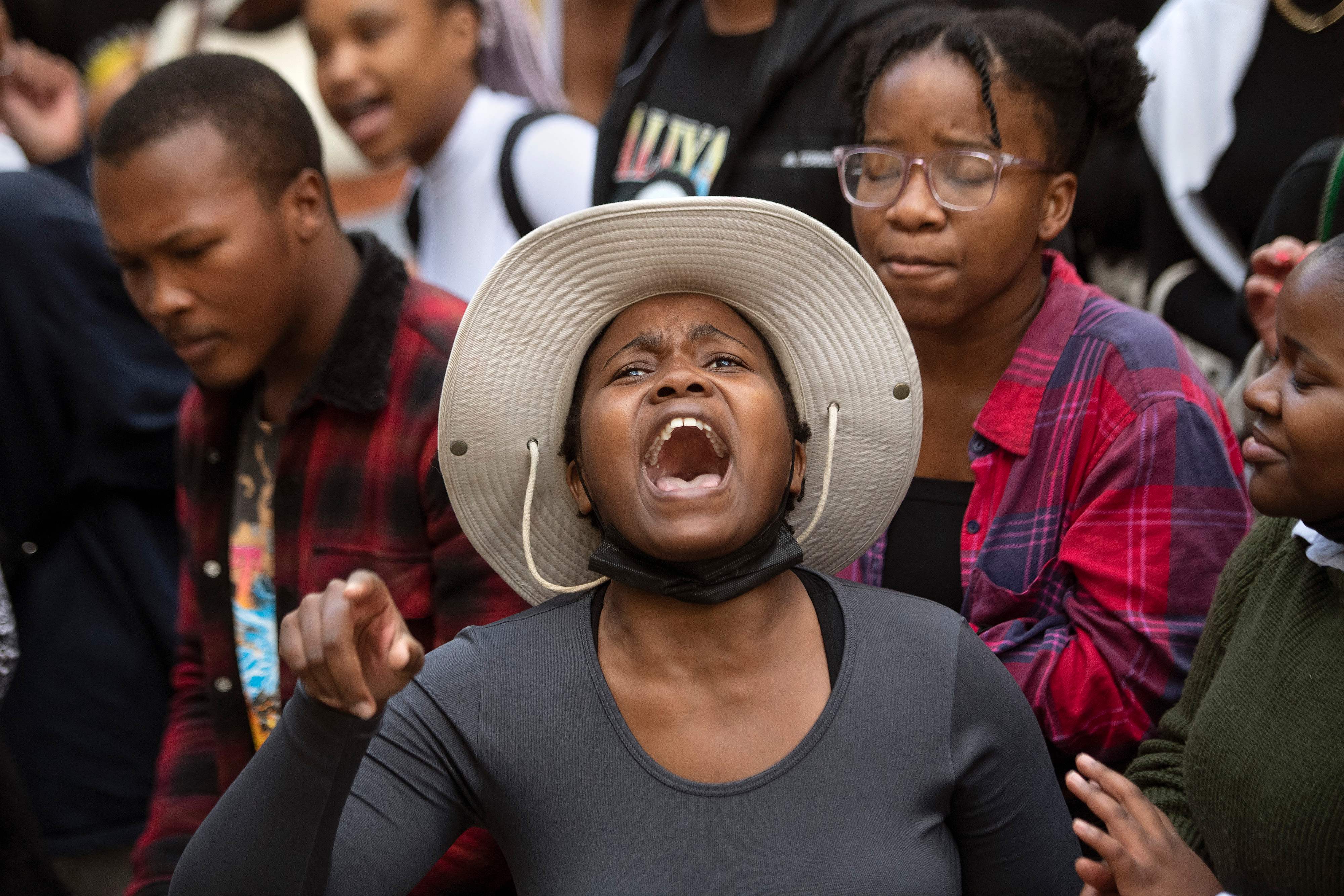Race row explodes at South African university after white student urinates on Black student’s belongings
Theuns du Toit has been suspended after he was caught urinating on the laptop of fellow student Babalo Ndwayana

Footage of a white student urinating on a Black classmate’s belongings at one of South Africa’s oldest universities has reopened old wounds in a country still traumatised by apartheid.
This week, Stellenbosch University suspended Theuns du Toit and launched a formal investigation after the student was filmed urinating on the laptop, notes and desk of Babalo Ndwayana. Large student protests quickly followed on campus.
“It was very upsetting to see something like this happen in this day and age,” Rowena Muravha, a 21-year-old engineering student at Stellenbosch, told The Independent, adding that prejudice is not uncommon on campus. “It is shocking that there are people who are still racist to this extent.”
The incident underscores the persistence of racial hatred almost 30 years after white minority rule ended with elections in 1994, and a lack of progress in confronting discrimination, particularly among young South Africans who did not experience apartheid.
“Students and academics come from somewhere, and these are the cultures unfortunately that they have been raised in,” Barbara Boswell, an English professor at the University of Cape Town, tells The Independent. “To feel the entitlement to be able to break into someone else’s room and urinate on their possessions gives you a kind of insight into the mindset with which this young man was raised.”
Like many prominent South African universities, Stellenbosch was previously designated for white students and staff only, and produced many apartheid leaders. In recent years it has undergone a “transformation” to address its racist past, including through scholarships and switching its language of instruction from Afrikaans, the language of Dutch settlers, to English. Changing the country’s historically white-dominated universities has been a priority for successive governments.
In a statement, university spokesperson Martin Vilioen said the school “strongly condemns the destructive, hurtful and racist incident”. It has not ruled out criminal charges. Mr Ndwayana, 19, has been offered counselling and will be provided with a new laptop and special dispensation come exam time, the university said.
The agriculture management student was asleep in his room in the Huis Marais residence in the early hours of 15 May when Mr Du Toit, a first year law student, entered and urinated on his belongings. In the footage, widely watched in South Africa, Mr Ndwayana can be heard asking for an explanation. “It was traumatising and I feel like my dignity was taken away,” he told the News24 website.
At an emergency meeting in the residence hours later, Mr Du Toit said: “I know what I did was wrong and I just want to apologise. Sorry guys.”
On Tuesday night it was reported that Mr Ndwayana, who is from Eastern Cape, South Africa’s poorest province, had decided to press charges against Mr Du Toit, after earlier expressing a willingness to forgive him.
Meanwhile, some 75,000 people have signed a petition calling for Mr Du Toit to be thrown out. A number of South African celebrities have echoed the calls.
Leon Schreiber, an MP from the opposition party Democratic Alliance, who studied at Stellenbosch University, said in a statement: “The incident, captured on video, is humiliating, hurtful and infringed upon the constitutionally enshrined right to dignity of the victim.”
It is not the first incident at a university to inflame racial tensions in post-apartheid South Africa. In 2008, a video showing white students feeding soup that they had urinated in to a group of Black cleaners at the University of the Free State sparked outrage.
Three years ago, academics at Stellenbosch published a widely criticised paper about the cognitive deficiency of “coloured” women, a term that is used in South Africa to denote people of mixed race.
Students have long been drivers of social change in the country. In 1976, thousands of Black schoolchildren left their classrooms to express their displeasure at being taught in Afrikaans. In Soweto, police fired on the crowd.

In 2015, South African universities erupted in protest against discrimination, with students demanding their curriculums be “decolonised”. In response, the University of Cape Town formed an independent commission that found evidence of “systematic suppression of Black excellence” at the university.
Three decades after Nelson Mandela was freed from prison, heralding a new dawn in South Africa, the economic and educational inequalities wrought by apartheid remain.
Ten per cent of South Africans own more than 80 per cent of the wealth, according to the World Bank, making it one of the world’s most unequal countries. Around 70 per cent of top management positions are filled by white South Africans, according to the Commission for Employment Equity. More than a third of South Africans were unemployed in late 2021.
“This is not a university problem, it’s a problem that is society-wide,” said Ms Boswell, “and universities then become microcosms where people are in kind of a pressure-cooker environment with these hostilities.”






Join our commenting forum
Join thought-provoking conversations, follow other Independent readers and see their replies
Comments